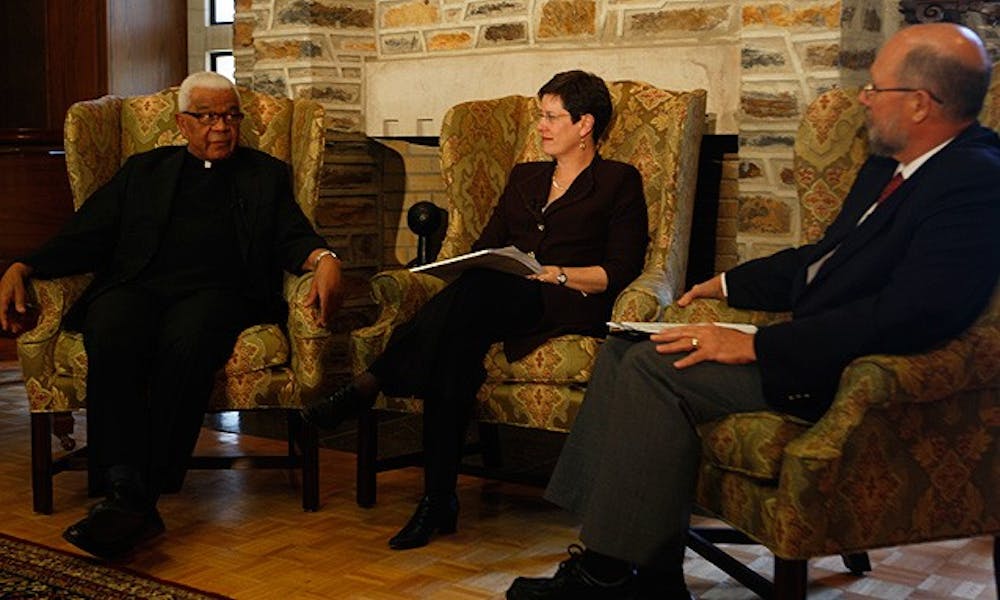Archbishop Walter Paul Khotso Makhulu brought insights on leadership and faith to a conversation in the Divinity School Friday afternoon.
The event, sponsored by the Center for International Studies’ Concilium on South Africa, was held in the School’s Alumni Commons room.
Makhulu, emeritus archbishop of the province of Central Africa for the Anglican Church, ran an underground railroad for refugees in South Africa during apartheid, and also served as a president of the World Council of Churches and All Africa Conference of Churches. He was interviewed by Karin Shapiro, visiting associate professor of history, and John Allen, who wrote the authorized biography of Archbishop Desmond Tutu.
The conversation was part of an extensive oral interview by Shapiro and Allen. It consisted of questions about Makhulu’s life, mainly dealing with apartheid and his work to end it.
Makhulu recalled his childhood in South Africa, during which each member of his family was labeled and classified according to skin color. Makhulu said his family did not allow him to be limited by the color of his skin.
For example, he recalled his father saying, “My son, we know what we are. No one defines us.”
He talked further about his experience living through apartheid. When asked why he worked to save people through the underground railroad, he said as a preacher he was impelled to do so.
“You can’t dwell in heaven and heavenly things when people around you are struck by earthly things,” Makhulu said.
The conversation also touched on his experiences as a leader for different groups—gangsters, refugees, church members and influential dignitaries. Shapiro emphasized his unique leadership.
“He acted in a quiet way—of course, he had to of necessity—and he was helping the liberation movements and people in South Africa who fought against apartheid,” Shapiro said. “What students will learn is that leadership works in different ways. Sometimes it’s through bold and dramatic acts and sometimes it’s quietly helping people and ensuring that people feel that they are valued, that there’s dignity in their lives—that they have money to educate their children, bury their dead, fight legal battles and work together in a union movement.”
This event also had an impact on some students. Makhulu spoke to Shapiro’s history class as well as in Randolph residence hall on East Campus. For junior Rose Filler, a history major who is writing a research paper on Makhulu, the event reshaped her image of the archbishop.
“Meeting him changed the whole way I was looking at my research because suddenly he wasn’t just someone that I was describing or researching about—he was a real human being,” she said. “So it was probably one of the coolest experiences I’ve had academically.”
When asked what his leadership meant to him on a personal level, Makhulu gave an answer focused on others.
“I’m a servant. That’s the first thing. I’m an enabler, helping other people because I believe essentially in people realizing their full potential,” Makhulu said. “I am not a solution. People must journey their own journey. But still they can be facilitated, yes.”
Get The Chronicle straight to your inbox
Signup for our weekly newsletter. Cancel at any time.

